|
Early Years
Joseph Stevens Junior married Lucy
Hubbal in 1881, who unfortunately suffered from deafness
for most of her life. They had a house in Burleigh Road,
Penn Fields, Wolverhampton where their first two
children were born. Their first child, Joan was born in
1911, and two years later, on 4th April, 1913, their
second child Geoffrey Henry Stevens entered the world.
At the time, the Stevens brothers
decision to form A.J.S. had been vindicated. Their
products were popular, sales were good, and a bright
future seemed certain. When Geoff was about 5 years old
the family moved into a larger house at 4 Oaklands Road.
They had a large garden that extended as far as Lonsdale
Road, around 120 yards in length. Their neighbours in
Lonsdale Road, in the last house before Lea Road were
Geoff's Uncle Billie and his wife Nesta. |
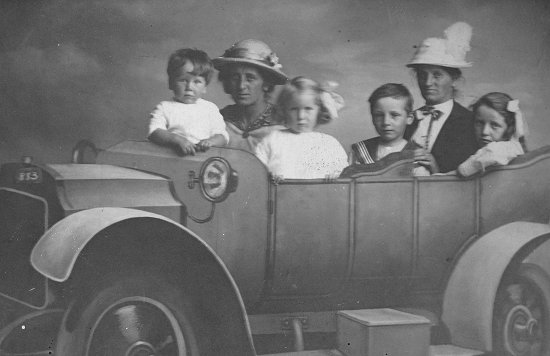
A young Geoff on the far left. Courtesy of
Peter Stevens.
|
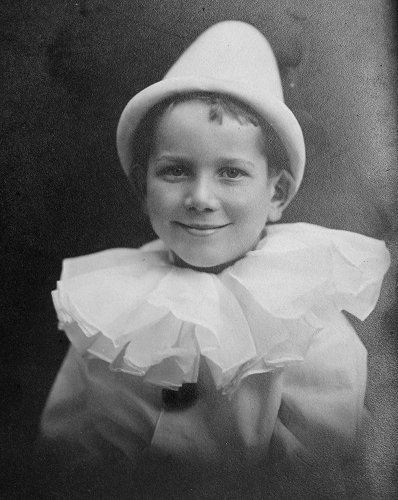
Geoff in costume. Courtesy of
Peter Stevens. |
The Stevens family lived in some style. They had a
full time and a part time gardener, 2 live-in servants,
a chauffeur and a big car.
One of their prized possessions was a German made "violina",
a musical instrument that was something like a pianola.
It was in a large oak case, and powered by treadle
operated bellows. It had a keyboard, and accepted paper
music rolls for automatic playing.
At the top were 4 violins that were operated by
mechanical levers along each neck, and a circular bow.
The instrument was so big that a hole had to be
knocked into the sitting room wall for the mechanism,
that stood in the adjacent pantry.
Geoff's Uncle Jack also had one, in a mahogany case.
He eventually donated it to the London Piano Museum. |
|
As a child Geoff loved to play with
Meccano, and if he was given a toy he would take it apart
to see how it worked, then put it together again. He
also built a crystal set with cardboard and bits of
wire.
When he was old enough to ride a
motorcycle he was given one by his father. He promptly
took it to pieces, learned how it worked, and
reassembled it. He then discovered the joy of riding it.
Geoff had an extremely happy family
life. In 1921 his younger brother Alec was born, and
they remained the best of friends for the rest of their
lives.
The family used to visit the Isle
of Man every year for the T.T. races. Geoff remembered
being driven around the course in a taxi to get an idea
of what it would be like to ride a motorcycle at speed
on the challenging circuit.
His school life began at Bingley
Street Infants School, followed by Bingley Street Junior
School, and then Wolverhampton Grammar School.
He greatly enjoyed school life, and
left in 1929 at the age of 16. His best subjects were
maths and physics. |
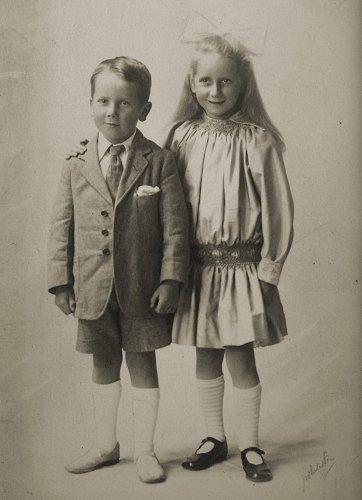
Geoff and Joan. Courtesy of Peter
Stevens. |
|
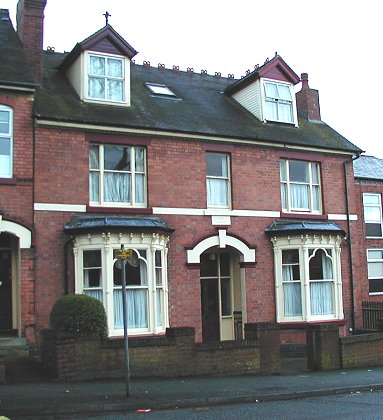
Number 4 Oaklands Road. |
Geoff's Uncle Harry also lived in Oaklands Road,
further up the hill at number 25. He had been an
enthusiastic radio amateur since before the First World
War, and built a large mast and aerial in his back
garden.
He made frequent transmissions to fellow enthusiasts
using the call sign 5SY, and in the early 1920s used to
broadcast musical concerts on Sunday mornings to fellow
enthusiasts.
Local musicians would go to Harry's
house for the privilege of being heard on the new medium
of wireless.
Geoff's father Joe purchased a
radio receiver, and the whole family used to tune-in to
Harry's broadcasts. |
| Thanks to Harry's enthusiasm A.J.S. started to
manufacture radio receivers, and while Geoff was still
at school he used to help out at the Wireless Department
charging accumulators. Geoff was also impressed with the
grandfather clock that Harry designed and built. It was
battery powered, and later featured in an article in the
'Model Engineer', written by 'A.J.S.'
After leaving school in 1929 Geoff entered the family
business, initially working in the A.J.S. machine shop
at Graiseley Hill, cutting gears, followed by a spell in
the tool room. At the time, the trade suffered terribly
because of seasonal fluctuations, and falling sales.
Geoff's father realised that the company's days were
numbered, and as a result he moved Geoff into the Sales
Department, thinking that sales experience might be
useful in the future. Geoff remembered the happy
atmosphere at the company and also the loyalty of the
staff.
In 1929 he went to Scotland for the first time, on a
motorcycle, with his best friend Jim Thomas. They stayed
with Jim's aunt in Galloway. In 1930 Geoff made a solo
motorcycle trip from Land's End to John O'Groats.
A New Era
When A.J.S. went into voluntary liquidation in
October 1931, the four brothers had to start again from
scratch, they had lost almost everything. Geoff's father
Joe sold their house in Oaklands Road and they moved to
22 Birchwood Road, Penn, Wolverhampton. |
|
When A.J.S. opened the factory at
Graiseley Hill, the four brothers allowed their sisters
and father to move into their old premises in Retreat
Street and use it for the Stevens Screw Company, that
had a factory across the road.
After the liquidation the four
brothers asked their father if they could move back into
their old factory in order to start a new business, and
he agreed. |
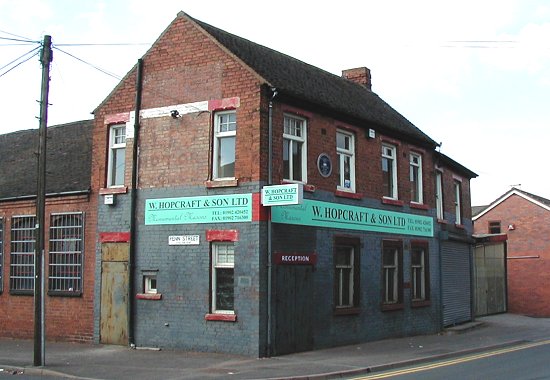
The old Stevens' factory in
Retreat Street, as it was in 2002. |
|
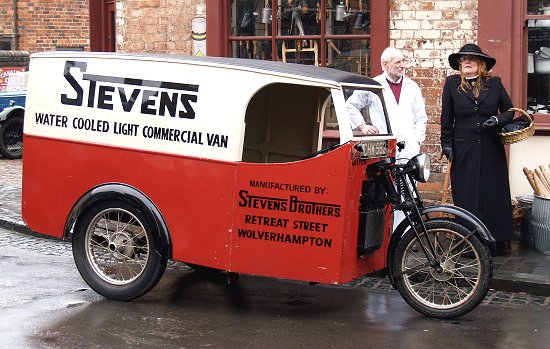
The Stevens 3-wheel van at the
Black Country Living Museum. |
| Working on a shoestring they set up a new
company called Stevens Brothers (Wolverhampton)
Ltd., in May 1932. The directors were the five
brothers; Harry, George, Joe, Jack and Billie.
Working around the clock and assisted by a number of
unpaid volunteers, they managed to design and develop
the 'Stevens Light Commercial Vehicle', a three
wheeled van that would sell for around £70. At the
time the cheapest Austin or Morris van cost just
over £100. Geoff worked at the new company for a
while, doing drilling jobs on the main frame, the
forks, brakes, and anchor plates. He also cut gears
and made cams which were hand-filed to the correct
profile. The vehicles were produced in batches of 6.
Enough parts were made for 6 vehicles, which were
built in a row. After completion the whole
process started again. Geoff was still very much a
trainee, he was under 21 years old at the time, and
earned 10 shillings a week.
A New Career |
|
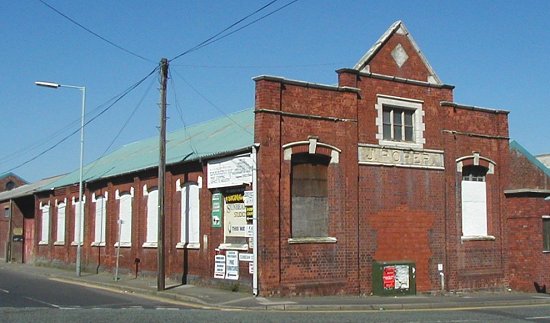
John Roper's factory in Upper
Villiers Street. |
Geoff soon left the company to work for John Roper,
a well-known precision engineer, who had a small factory
in Upper Villiers Street, and offered a salary of 24
shillings a week.
The company had a workforce of 6, including 3 members
of the Roper family, and made cut-price parts for cars,
including gears. |
| Geoff worked on centre lathes and turret lathes, but
the Ropers kept the gear cutting to themselves, being
afraid that their techniques would be copied. Around
1935 Geoff went to work for Austin at Longbridge, at a
starting salary of £5.12s.6d a week. He entered a very
different industrial world to what he had seen before.
Everything was done on a grand scale, with a vast
workforce, using the most up-to-date machinery. For some
time the other employees kept themselves to themselves,
and hardly spoke, or helped him in any way. He was seen
as an outsider. There were no chucks on the drills, you
had to take your own toolbox, and your own chuck to
work, and guard them at all times, otherwise they would
disappear. This was very different to the friendly
atmosphere that he had experienced at A.J.S.
His working days were long because of the travelling
time to, and from Longbridge. To ease the journey, his
supervisor arranged for him to buy a brand new Austin 7
car, from the factory, at cost price. As a result he had
a brand new car every year, during his time at Longbridge. Unfortunately this caused some resentment
amongst his colleagues who didn’t qualify for a cheap
car because they lived much closer to the factory.
Geoff joined the Territorial Army with a group of
friends. In 1938 during the Munich crisis he was
called-up to a T.A. camp. On his return to work he found
that his daytime job had been given to someone else, and
he was forced to work nights. With help from his trade
union he successfully fought the decision and returned
to his day job. As a result of this unpleasant
experience he became disillusioned with the T.A. and
promptly resigned from it.
Although his experience at Austin could have been far
better, he did see the latest production techniques at
first hand, and gained experience of jig boring, a
complex technique, that would become his speciality.
|
| Around 1936 Geoff met his future wife Hetty Riley at
a Goodyear works dance, held at the George Hotel in
Stafford Street, Wolverhampton, now called the Varsity.
They became good friends and went to many dances,
travelling as far afield as Trentham Gardens.
On 5th August, 1939 they married at St.
Michael’s Church in Tettenhall, held their reception at
the Star & Garter Hotel in Victoria Street, and went to
Scotland for their honeymoon.
They moved into their first home at 75 Ward Road,
Goldthorn Park, Wolverhampton.
They were very happy, always the best of friends.
Life together was full of enjoyment, and a sense of fun.
They became an extremely close couple. |
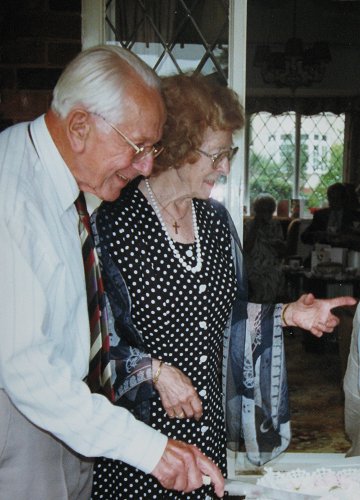
Geoff and Hetty in later life.
Courtesy of Peter Stevens. |
|
In 1939 Geoff left Austin and moved
to Auto Machinists Limited, a company that had been
started by his father and his Uncle Jack in 1934. They
initially machined parts for cars, and did engine
boring, but this proved to be unprofitable. They then
began to make jigs and fixings, and so were delighted
when Geoff setup a jig boring facility at the factory in
Poplar Street, Wolverhampton.

At work at Austin. Geoff is in the centre
foreground, side-on looking towards the bench. Courtesy of Peter Stevens. |
During World War 2 Geoff joined the
Home Guard. One of his duties was to assist in an
anti-aircraft gun unit at Wolverhampton Racecourse. He
operated an aircraft predictor, a complex piece of
equipment that mechanically carried out calculations
that were used to adjust the settings on the gun.
For some reason, a group of Home
Guard personnel decided to dismantle the predictor, and
couldn’t reassemble it. Luckily Geoff was at hand, and
using his vast engineering knowledge, he advised the
officers and told them what to do to get it working
again. As a result he received an award for being the
best instrument technician in the battery. |
 |
|
 |
|
 |
|
Return to
Family Background |
|
Return to the
beginning |
|
Proceed to
Later Years |
|